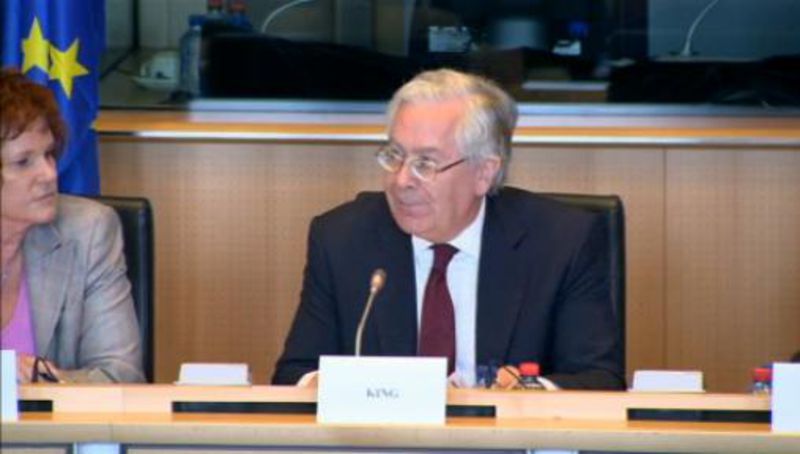Whoever is exiting the crisis three steps forward! Bulgaria, where are you going?
Adelina Marini, April 17, 2010
 The conclusion of a large part of EU member states is that the stability and convergence programmes have already started fiscal consolidation one way or another. In some countries this is clearer than others, as the statement of EU ministers of finance says. They have an informal meeting in Madrid. According to the statement, presented last night by the Spanish minister of finance Elena Salgado, the economies of some member states will start growing in 2011, while in others this will happen later.
The conclusion of a large part of EU member states is that the stability and convergence programmes have already started fiscal consolidation one way or another. In some countries this is clearer than others, as the statement of EU ministers of finance says. They have an informal meeting in Madrid. According to the statement, presented last night by the Spanish minister of finance Elena Salgado, the economies of some member states will start growing in 2011, while in others this will happen later.
Ms Salgado also reported that the Economic and Monetary Affairs Commissioner Olli Rehn had presented to the financial ministers, attending the meeting (9 of them could not make it because of many closed airports around Europe) the proposal, which will be ready by June 12, for better coordination of economic policies and of surveillance. This proposal will enable the Commission to pay more attention to member states' public debt. In other words, the Commission will no longer consider only data about the budgetary deficit but also about public debt, the Spanish minister of finance explained.
Her statement however did not mention even a word about the change of Bulgaria's budgetary data, as the deputy premier and minister of finance of Bulgaria Simeon Dyankov announced a week ago. He even explained that he was to be very ashamed during the meeting in Madrid. According to a press release of the Ministry of Finance however, the European Commission had defined as adequate the Convergence programme of the country, although the programmes of many member states were not reviewed and approved because of the absence of some ministers of finance.
There are several contradictory theses in the press release, which does not give a very clear perspective where this "positive assessment" came from - be it from a conversation at the informal Council or be it from a bilateral meeting with Commissioner Olli Rehn, or with the president of the European Central Bank Jean-Claude Trichet.
The press release says that "the programme objective to maintain stable  budgetary policy can be considered adequate in the current economic situation". In the same time it says that the new Bulgarian government is expected to neutralize the risks through the slightly better data about growth and the collection of revenues. Against this background, the comment of minister Dyankov "In other words, the European Commission approves and considers as adequate our Convergence programme. This gives us opportunity in the next days and weeks to deal with the issue together with our partners from the Commission, whom we have invited to come in the beginning of May to assess whether Bulgaria should enter into an excessive deficit procedure or we can avoid this", sounds odd.
budgetary policy can be considered adequate in the current economic situation". In the same time it says that the new Bulgarian government is expected to neutralize the risks through the slightly better data about growth and the collection of revenues. Against this background, the comment of minister Dyankov "In other words, the European Commission approves and considers as adequate our Convergence programme. This gives us opportunity in the next days and weeks to deal with the issue together with our partners from the Commission, whom we have invited to come in the beginning of May to assess whether Bulgaria should enter into an excessive deficit procedure or we can avoid this", sounds odd.
Especially because of the following text in the press release: "In order to improve effectiveness of public spending through strict implementation of planned reforms, reforms in the public administration, healthcare system, education and pensions is needed". This, according to the Ministry of Finance is the comment of the Commission on our Convergence programme. This comment in fact makes pointless everything written before that, because with a lack of reforms in these public sectors, any expectations for fiscal improvements would be inadequate.
Such a reaction of the minister of finance in the current circumstances in Bulgaria and in the European economy, is to put it mildly - irrelevant for several reasons. The first one is that purely psychologically interpretations of an objective analysis in a positive direction is doing a bad favour both to the government and the public which remains with the illusion that things are going well.
Secondly, given the initial support in the Eurogroup (whose Council is always before the EU financial ministers meeting) about the Commission proposal to tighten regulation and economic policies coordination, minister Dyankov could have put the Bulgarian visions in this context.
A very serious reform is under way of the European relations in the economic and fiscal policies. Minister Dyankov would probably do the right thing to start imagining how a country will look like presenting its national budget for assessment and analysis by the European Commission before it is filed in Parliament. And not only imagine this but also explain to the public his position about such a cooperation and whether it could be useful for our country or not.
 Minister Dyankov did not comment on the fact that the ministers discussed EU's desire for a change of the representative quota of the Union in the International Monetary Fund. According to the statement, the number of European ministers in the Fund should be increased in order to reflect more precisely the significance of countries in the global economy. Besides, the EU would want an improvement of financial instruments for the low-income countries. Is Bulgaria such a country - this is what Simeon Dyankov was supposed to explain.
Minister Dyankov did not comment on the fact that the ministers discussed EU's desire for a change of the representative quota of the Union in the International Monetary Fund. According to the statement, the number of European ministers in the Fund should be increased in order to reflect more precisely the significance of countries in the global economy. Besides, the EU would want an improvement of financial instruments for the low-income countries. Is Bulgaria such a country - this is what Simeon Dyankov was supposed to explain.
 | © European Union
| © European Union | © European Union
| © European Union | © European Union
| © European Union Angela Merkel, Emmanuel Macron | © Council of the EU
Angela Merkel, Emmanuel Macron | © Council of the EU Benoit Coeure | © Council of the EU
Benoit Coeure | © Council of the EU Pierre Moscovici | © Council of the EU
Pierre Moscovici | © Council of the EU